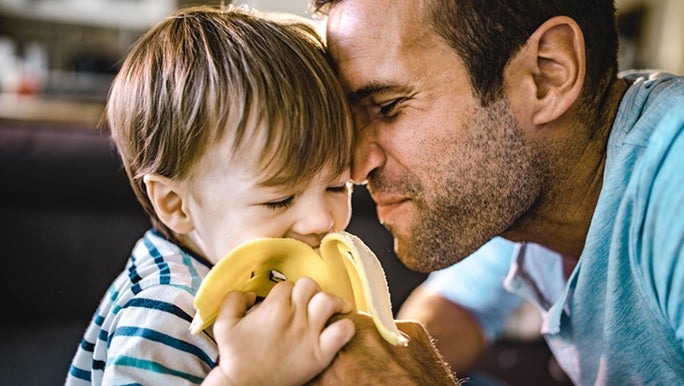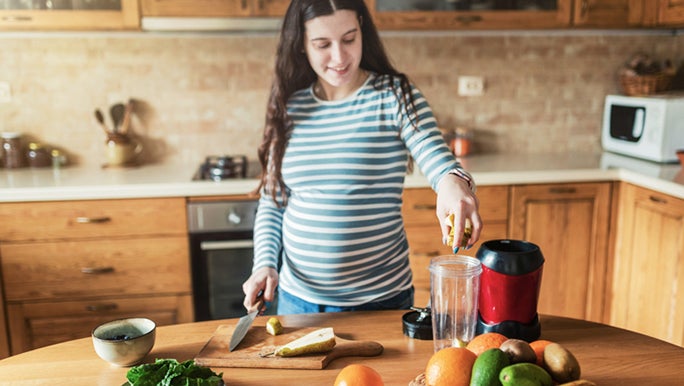Key Points
- Bananas can help to support a healthier gut
- A standard banana contains antioxidants, vitamins and potassium
- A balanced diet of whole foods of all colours is best
Short answer – yes! The evidence suggests bananas are great for gut health. They also taste great, come in their own sustainable packaging, are packed with nutrients and are a filling snack.
Fun fact: there are over 500 known banana plant varieties worldwide, many of which have similar nutritional values. A standard banana contains fibre, potassium, vitamin B6, vitamin C and healthy carbohydrates, but no fat, salt or cholesterol. That makes them one of the healthiest foods around.
But are bananas good for gut health? The evidence looks promising.
So, let’s look at the basics of eating bananas for gut health and how this wonder fruit can support a healthier gastrointestinal system.
Why are bananas good for gut health?
The importance of good gut health has become even more apparent in recent years. As the place where our body breaks down food, absorbs nutrients and helps to balance good and bad bacteria, we want our gastrointestinal system to be as healthy as possible.
Here are some positive indications that bananas help to support gut health.
- They’re an excellent source of gut-healthy fibre: Fibre helps to promote feelings of fullness. Bananas have a soothing effect on the gut due to their high pectin content, a soluble fibre that not only helps lower cholesterol but normalises bowel function. This dietary fibre helps fruits keep their form and can positively affect the small intestine. A study of some Bangladeshi children with persistent diarrhea found that a diet containing pectin and green bananas reduced fluid loss and improved the permeability of the small intestine. They also contain inulin, a type of prebiotic fibre that has been shown to stimulate the growth of good bacteria in our gastrointestinal system.
- They’re natural prebiotics: Green banana flour for gut health is another way to reap the benefits. The resistant starch content of green banana flour has been shown to support the gut microbiota, meaning it can support a healthier gastrointestinal system.
- They’re full of nutrients: The average banana contains vitamin B6, vitamin C, potassium, carbohydrates, fibre and antioxidants, just to name a few.
The consensus? On the ‘worst foods for gut health’ list, it’s not likely you’ll see the nutrient-dense banana.

It’s healthier to eat bananas in their fresh form instead of as a processed snack, like banana chips
But wait — aren’t bananas full of carbs and sugar?
Bananas and gut health aside, you might wonder about this delicious yellow fruit’s carb and sugar content. On average, a medium-ripe banana contains around 28 grams of carbohydrates and 15 grams of sugar. But this isn’t the same type of sugar you’ll find in a can of soft drink. It’s a naturally occurring sugar.
And it’s accompanied by nutrients like fibre, vitamins and minerals, so it’s better for your overall health.
We asked Registered Pharmacist and Nutritionist Sarah Gray whether there could be such a thing as eating too many bananas.
“I wouldn’t avoid eating bananas because of their carb and sugar content,” she says. “More likely, you would eat them in moderation to fit all the other fruits and vegetables into your day.”
GI and GL scores
The glycemic index (GI) measures how much our blood sugar levels rise after eating a particular food. On the scale, anything less than 55 is considered low. Thankfully, ripe bananas score 51, and their under-ripe counterparts score 42.
Likewise, we should also measure glycemic load (GL), which accounts for a food’s GI score and how many carbohydrates it has. In this arena, bananas had a GL of 13, with 10 or fewer considered low.
But while the carbohydrate content in a banana is slightly higher than other fruits, it’s not necessarily bad. The carbs in a banana are ‘resistant starch’, which is similar to dietary fibre. This means it won’t release as much glucose, and it helps you feel fuller because it’s broken down slowly. This satiety factor is likely just one of the reasons why athletes love munching on bananas.
How do banana chips rate?
Sarah says eating fruits and vegetables in the freshest form possible is usually best, especially when eating bananas for gut health.
“Snacks like banana chips can sometimes have high amounts of sugar and added preservatives, so you have to be mindful,” she says.
As always, check the nutritional information of any packaged or processed food before eating, including banana-related snacks.

If you suffer from IBS or other gut issues, it’s wise to avoid bananas if they cause gas and bloating
Can bananas worsen gut health?
We know the good stuff about bananas and gut health, but can they potentially worsen it? There are a few factors to consider.
A study on irritable bowel syndrome (IBS) and potential food triggers listed fruits like bananas and citrus as possible offenders. Sufferers of IBS should monitor symptoms to see if this is true for them.
Another concern about bananas is the presence of a naturally occurring sugar alcohol called sorbitol. As our bodies take time to metabolise it, consuming large amounts can create a laxative effect. And because bananas are also high in soluble fibre, it may lead to gas and bloating.
Are they FODMAP-friendly?
According to Monash University, the latest findings on bananas are that firm is better than ripe if you follow a low-FODMAP food list. This is because ripe bananas are higher in oligo-fructans and firm bananas are lower in oligo-fructans.
Oligo-fructans are fruit sugars that can cause gut issues for some people, and when bananas are stored for a long time and become ripe, fructan levels increase.
However, the FODMAP researchers at Monash University advise that if you usually tolerate ripe bananas, there’s no need to remove them from your diet.
Who shouldn’t be eating bananas?
Generally, bananas are OK for most people to eat, but there are some exceptions.
“I would obviously advise those who don’t like bananas to avoid eating them,” says Sarah. “And people who are allergic or have intolerances.”
Some medications can interfere with the excretion or absorption of nutrients, including the potassium found in bananas. Therefore, always consult your healthcare professional if you’re unsure. They can assess any other conditions, symptoms, medications, intolerances and allergies that may be affected by your diet.

Bananas are a great snack – but make sure you’re eating a rainbow of fruits and vegetables each day
An ‘a-peeling’ snack for gut health
Bananas are possibly one of the best fruits for gut health, but they shouldn’t be the only food on your plate. Research shows that a diet rich in colour with various fruits, vegetables and other whole foods is a great way to support healthier living.
Eating bananas for gut health is excellent as long as you back it up with a balanced diet. As always, speak with your healthcare professional if you’re worried about interferences with medication or any other medical conditions or symptoms that may concern you.
Related:
Sarah Gray is both a Registered Pharmacist and Registered Nutritionist with a particular interest in health education and helping people to take small steps to big changes in their health journey. Sarah is a member of the healthylife Advisory Board.
Reviewed by the healthylife health experts January 2023.



